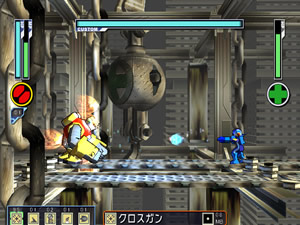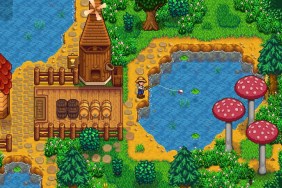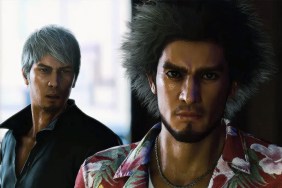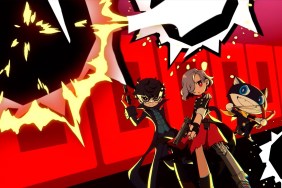Battle of the Network Mega Stars.
The Mega Man Battle Network series on the Game Boy Advance reprogrammed
the mega-mythos we all know and love into a digital pet game. In the three Action/RPG
GBA games thus far, Mega Man teams up with his human trainer and best bud, Lan
Hikari, to combat ne’er-do-well viruses online.
Geez, it sure would be helpful to have a Mega Man of my very own just to power
blast all my junk e-mail away. “Johnny Liu  increase your bust size from a
measly A to a voluptuous double D!” *BLAM!* My bust size is fine,
thank you very much. Unfortunately, there’s no “Mega Man Spam Killer” for my
e-mail just yet, but at least the blue bomber made it to the Gamecube.
Mega
Man Network Transmission takes the Mega Man Battle Network formula
and attempts to bring it back into the classic action realm. It’s a hard pill
to swallow. The most interesting RPG parts of Battle Network are left
behind, and the action is not as good as the best of the Mega Man series.
With some unbalanced difficulty, this is not a Mega Man for the masses.
Part of what made Battle Network good was the dichotomy of a human
world and an online net. In Network Transmission, there is no dichotomy
 just action levels set online and the cheap facade of a normal world. Movement
around the normal world, with a steady increase of new areas and a shop, is
done via a simple map that doesn’t add any sense of environment or immersion.
Instead, we get the classic Mega Man action stages with a degree of
backtracking after upgrades have been made ala Metroid.
The “Chip Weapon” upgrade system has been grafted into the traditional action
game with fair results.
In Battle Network, the Chip system allowed Mega Man to have a range
of selectable weapons, such as a shot that would spread into a V, a sword, or
bombs to lob. Battles would take place on a small grid. The different attacks
directly complemented the grid environment, creating offensive and defensive
points for each attack. Network Transmission forces that grid system
back into a 2D world, thus creating a smaller margin of error with a tendency
towards a strict timing scheme.
In turn, Network Transmission encourages the old-school trial and error
gameplay, with its complete absence of continues and abundance of punishing
instant deaths. With this trial and error comes a mastery of which chip weapons
are best for which scenario, a hallmark of the series. Perhaps the RPG element
that should have been added was steady growth that rewarded each attempt instead
of instant deletion.
When you start a new life, you pick from a selection of five chip weapons.
There’s also the very weak basic shot. At certain times, it is to your strategic
advantage to use the weak shot, thus saving your weapon chips while still avoiding
damage. The timer to reset your chip weapons is painfully slow. It made sense
in the direct one on one battles of Battle Network to have a timer, but
in Network Transmission where you can just as easily stand in place without
any damage to reset the timer, it’s more of a hassle.
If you take on Network Transmission, expect to play the first two levels
several times over  getting the knack of using the proper battle chips can
be trying, and don’t expect much luck by way of random enemy actions.
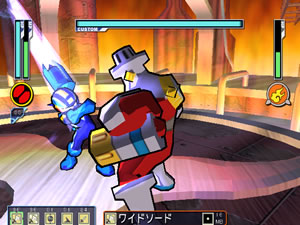 For
For
instance, while it can be relatively easy to learn how to slide under Fire Man’s
torch blasts, he may just as likely start walking towards you on one try as
he is to walk away. If he walks toward you, the torch blast timing becomes much
harder, and then whammo! – quick death.
Even though you can set some default chip items to be ready upon starting
an action sequence, the weapon system is more predicated upon the luck of the
draw. Once you do get over the initial difficulty, the game evens out a touch,
but by then, most people will have already left.
Of any Gamecube game, this one would make the most sense for GBA connectivity.
The Game Boy Advance could act like one of the digital PDA devices featured
in the game, where little Mega Man could live and then “jack in” to the big
scary “net” on the Gamecube. For a game about network connectivity, not utilizing
any form of it is just a shame.
Stylistically, the cel-shading of Network Transmission could have used
some more detail, but the highly contrasted light-sourcing effects add considerably
to the look. It pales next to Wind
Waker, but the cartoony graphics are decent. The electronic theme is adequately
represented with wires, neon, chips, and ‘net’ imagery everywhere.
The music references the digital pops and clicks of computer noises to create a series of heavily electronic sounding tunes. The voices are in the original Japanese, which is par for the course of the series.
Mega Man Network Transmission‘s gameplay is simply not as strong as
either of the two original parent entities on their own. It’s as if the balanced
half-action, half-RPG formula of the Network Series was just tossed into
the classic Mega Man action mold, creating an unbalanced partial-RPG
with a merely satisfactory mix of action. While there are some good action bits
that do justice to Mega Man‘s long history, Network Transmission
is not among the best of the series. Still, those of you who have followed Mega
Man through his 15 years of gaming may find enough fond memories here to warrant
a go.
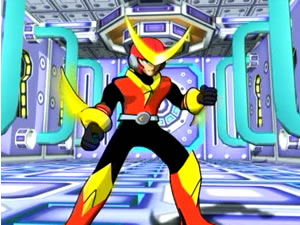
-
Classic Mega Man villains
-
Some good action after initial hurdles
-
Good light-sourcing effects
-
Unbalanced difficulty at the onset
-
Shoehorning Battle Network with classic Mega Man
-
Best RPG bits of Battle Network left out
-
No GBA connectivity in a game ideally suited for it
